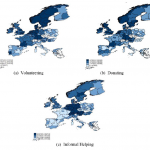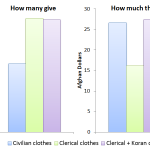A study out today has shown that marmosets, like humans, can and do act truly altruistically (see refs). Altruism is a hot topic in evolution. True altruism would, on the face of it, reduce an individual’s reproductive fitness, and so you might expect that natural selection would weed out any altruists.
As the Stanford Encylopedia of Philosophy puts it:
… by behaving altruistically an animal reduces its own fitness, so should be at a selective disadvantage vis-à-vis one which behaves selfishly. To see this, imagine that some members of a group of Vervet monkeys give alarm calls when they see predators, but others do not. Other things being equal, the latter will have an advantage. By selfishly refusing to give an alarm call, a monkey can reduce the chance that it will itself be attacked, while at the same time benefiting from the alarm calls of others. So we should expect natural selection to favour those monkeys that do not give alarm calls over those that do.
The realisation that evolution acts at the level of the gene, rather than the individual, partially resolves the paradox. Kin selection gives an evolutionary reward for helping out relatives. Reciprocal altruism, in which an altruistic act increases the individual’s chances of help in the future, can explain some other altruistic acts.
But humans also engage in a different form of altruism – acts of generosity towards people who are not related and who are unlikely to personally repay the debt. Such altruism is rare among animals. But research published online today in the Proceedings of the National Academies of Science has shown that marmosets, too, engage in this form of ‘pure’ altruism.
Science explains the experiment:
To see whether marmosets are more selfless, a team of researchers led by anthropologist Judith Burkhart of the University of Zurich in Switzerland placed two of the monkeys in adjacent cages. The “donor” marmoset could reach one of two trays on a platform outside its cage. On each tray sat two dishes–one with a tasty cricket, the other without. When the donor monkey pulled a tray close, one dish came to it, while the second slid within reach of the “recipient” monkey next door. The researchers found that when another monkey was present, the donor was more than 20% more likely to pull the tray containing food to its counterpart. The donor was never rewarded for its good deed and knew it couldn’t score a cricket by pulling the tray, but that didn’t matter. It seems the marmoset simply felt the urge to feed a stranger.
So why should marmosets and humans have evolved this form of altruism, and not other primates such as chimpanzees? Burkart hypothesises that it is because both humans and marmosets are co-operative breeders, in which unrelated adults in the group (so-called ‘helpers’) take over some of the responsibility for child rearing. What do the helpers get out of the deal. Charles Snowdon, a psychologist at the University of Wisconsin, laid out the possibilities in a paper earlier this year:
- helpers that have cared for other infants have greater reproductive success when they become parents than individuals that do not have previous infant care experience
- unrelated helpers can gain the benefits of living in a social group (communal foraging or protection against predators)
- males that display involvement with infants are more likely to obtain subsequent mating with the female they assist
Within the context of a co-operative group, therefore, altruisitic behaviour can enhance reproductive fitness and becomes a worthwhile evolutionary strategy.
Refs:
- Burkart, J., Fehr, E., Efferson, C., & van Schaik, C. (2007). From the Cover: Other-regarding preferences in a non-human primate: Common marmosets provision food altruistically Proceedings of the National Academy of Sciences, 104 (50), 19762-19766 DOI: 10.1073/pnas.0710310104
- Silk et a. Chimpanzees are indifferent to the welfare of unrelated group members. Nature 437, 1357-1359 (27 October 2005) | doi:10.1038/nature04243
- Snowdon, C. T. & Cronin, K. A. (2007). Cooperative breeders do cooperate. Behavioural Processes, 76: 138-141.













